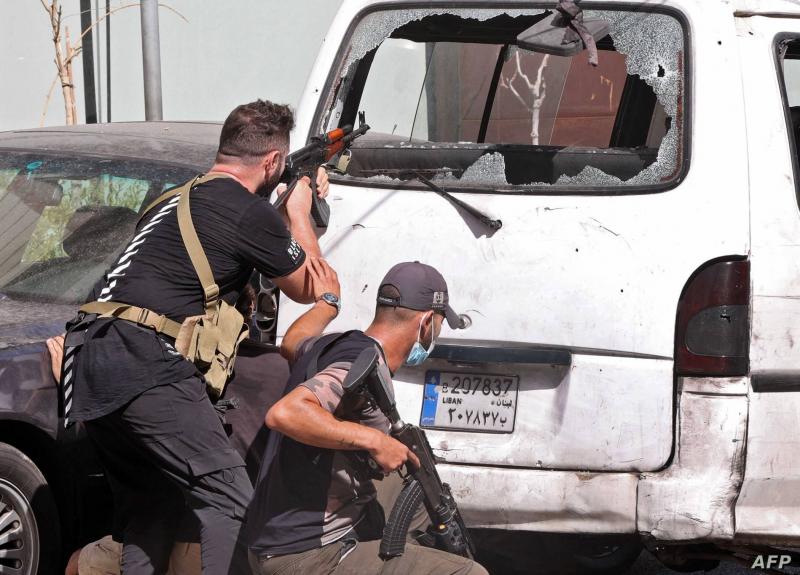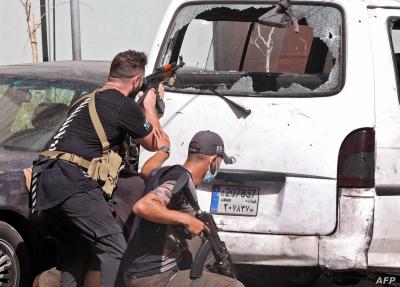Under the title "Arms Trade Thrives in Lebanon: Self-Defense Against Rising Crime Rates," the Al-Hurra website reported, citing the Associated Press, that the trade in small arms, such as pistols and RPGs (B7), is flourishing in Lebanon according to arms dealers. This reflects the increasing fears of Lebanese people regarding the deterioration of security conditions and their concerns for their personal safety, families, and properties.
The possession of personal weapons has long been a common phenomenon in Lebanon, even before the civil war years of the 1970s and 1980s. However, it is noteworthy that over 30 years after the end of the war, international estimates indicate that there are around two million firearms in the hands of Lebanese people. Three arms dealers from different Lebanese regions spoke to the Associated Press, stating that the demand for purchasing personal weapons has increased in recent months, despite prices ranging from hundreds to thousands of dollars amid the worst economic crisis the country has ever faced. This crisis has left its mark on various aspects of life, leading to a sense of insecurity among Lebanese citizens and the need to protect themselves as crime rates soar.
The "International Information," which specializes in statistical studies, published data indicating that during the first ten months of 2021, crime rates rose significantly compared to the same period in 2019. Car thefts increased by 212%, theft crimes by 265%, and homicides by 101% (from 89 homicides to 179). Arms sales have risen despite the Lebanese Ministry of Defense announcing a freeze on firearm licenses in March. In this context, the Lebanese Army issued a statement about a week ago regarding the October toll, stating that it arrested 486 individuals of different nationalities for involvement in various crimes, including "smuggling and possession of firearms," and seized 118 weapons of various types.
Despite this ban, the demand for personal weapons outside the legal framework is increasing. An arms dealer operating in the mountains overlooking Beirut, who requested anonymity due to the sensitivity of his activity, claimed to sell 300 automatic rifles monthly, noting a 60% increase in purchases, especially following sectarian clashes in the areas of Khalda (in August) and Tayouneh (in October), which resulted in dozens of casualties. The dealer said, "Those who come to buy weapons aim to secure personal protection for themselves and safeguard their money at home," as many people have started keeping their money at home following the banks' decision in 2020 to withhold depositors' funds and impose tight restrictions on withdrawals or transactions.
There are no official statistics in Lebanon regarding the number of firearms held by citizens or by parties and movements. Many have retained their personal weapons since the end of the civil war in 1990, but with the outbreak of the war in Syria ten years ago, smuggling activities across the borders between Lebanon and Syria increased. However, the relative decline in the intensity of the Syrian war has shifted smuggling activity more towards Lebanon.
According to a Swiss website that specializes in monitoring and combating the spread of small arms worldwide, there are 31.9 personal firearms for every 100 people in Lebanon, meaning the total number of firearms is approximately 1.927 million for a population of around six million. This places Lebanon second in the Arab world after Yemen and ninth globally in terms of the number of firearms per capita, surpassing Iraq, which has been mired in security and political chaos for nearly 20 years.
Another dealer, who also refused to disclose his name and is a man in his fifties active in one of Beirut's suburbs, stated that sales have significantly increased lately, especially following smuggling from Syria through the Bekaa Valley to Beirut. He estimated the increase, like the mountain dealer, at about 60%. He sells between 15 and 20 firearms monthly, including pistols, rifles, and grenades. The fifty-something dealer noted that the majority of buyers are young civilians and party affiliates, with a small number of older individuals. He added that this trade flourishes throughout Lebanon, including Beirut, the southern suburbs, and eastern Beirut neighborhoods, and that buyers' motives include securing personal protection, firearm collecting as a hobby, or exercising "influence and bullying."
This illegal commercial activity continues despite the collapse of the Lebanese pound's value. These dealers transact in dollars or sometimes their equivalent in pounds according to the daily black market exchange rate. The mountain dealer explained that prices range from $500 for some types of pistols to $4,500 for advanced automatic rifles. A 35-year-old third dealer, who also requested anonymity and is from an area near Beirut, indicated that he has been working in this field since he was eighteen, and mentioned selling an advanced rifle to a wealthy individual for $12,000.
The thirty-something dealer stated, "Most of the weapons come from the Bekaa and are distributed to other regions. We don't know where sales are more active because each dealer focuses on their customers and locale." Social science professor at the Lebanese University, researcher Khadija Mustafa, commented, "From a sociological perspective, personal armament in Western societies is usually for personal protection, but in Arab communities, including Lebanon, especially sectarian communities, the acquisition of arms shifts from individual motives to sectarian considerations, as if there is a need to protect the sect's status and power against another sect." However, the thirty-something dealer stated, "We dealers do not ask each other about sales, we do not inquire about the reasons, and we do not pose any questions so as not to raise the buyer's fears."




